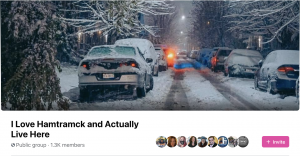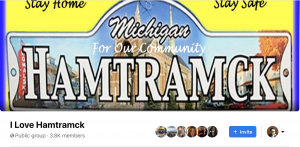Correction: An earlier version of this story neglected to mention that some feel the rules of “I Love Hamtramck” were too restrictive, and banning of users oftentimes unnecessary. The current story reflects these changes.
By Simon Albaugh – Yemeni American News
HAMTRAMCK, Mich. – As an indirect result of COVID-19, people are spending more time online. Facebook use went up by 27%, Netflix by 16% and even YouTube raised its use 15.3%. All these point to an upward trend in web use as a result of social distancing measures that have closed down our favorite restaurants, bars and other places for social gatherings. But this time spent online has its downsides, we saw it on Jan. 6.
According to outside research, sites like Facebook depend on an algorithm that prioritizes divisive content. This divisive content, an internal investigation found, was the most engaging content that extended a user’s time spent on the app. And in some ways, this has had disastrous consequences for many users who were susceptible to believing in far-flung conspiracy theories.
A lot of the most damaging content comes from Facebook groups, where people who may oftentimes be the most vehement supporters of certain issues set the tone for the group’s discussion. This top-down approach can be inescapable for the dynamics of groups, and even a small town like Hamtramck has the tone set for online discussion.
 One of the Hamtramck Groups, which was started “as a joke” by Andrew Perrotta, brother of Councilman Ian Perrotta. Andrew says the group is like a new home for “refugees” of “I Love Hamtramck”.
One of the Hamtramck Groups, which was started “as a joke” by Andrew Perrotta, brother of Councilman Ian Perrotta. Andrew says the group is like a new home for “refugees” of “I Love Hamtramck”.
Hamtramck, Online.
There is a plethora of groups for any given topic on Facebook. One quick search for Hamtramck on the site’s group feature shows over 70 groups covering a variety of interests like the GM Factory, or Pokemon Go meetups. Among these, three of the most popular online forums for Hamtramck are at the center of the online discussion.
During the heightened tension surrounding some of the high-profile ordinances that passed through Hamtramck – like the marijuana ordinance, tax measures, or the human rights ordinance – these forums were rife with controversial takes, and accusations toward the other side of the debate.
Andrew Perrotta, brother of Hamtramck Councilmember Ian Perrotta runs one of the groups that housed a lot of the debate around Marijuana’s role in Hamtramck. He says that the weed debate made him take a break from Facebook for a while because of the fractured debate around the topic.
“I think that’s what Facebook has done to a lot of people like,” Perrotta says. “It’s fractured them and then only brings them back together to fight. So I personally have been staying away from Facebook for the last couple months, especially after the marijuana. Just all the misinformation and like, it’s a full-time job going back and defending a post.”
Perrotta says he’s taken a hands-off approach to moderating the page, recently delegating the task of moderating to others in the online community. Instead of directly policing the speech of others, the community fosters some of the most active debate around what researcher Dr. Alisa Perkins calls Hamtramck’s “Ordinance Time.”
This style of allowing any and all speech has created a discourse that can have damaging consequences. During the debate around Hamtramck’s role in the marijuana industry, one user accused pro-marijuana advocates of keeping the first marijuana dispensary an open secret among themselves. People on the other side flung stereotypes and racist rhetoric to the Muslim-majority who were against the dispensaries. All of it created a hostile environment for debate.
In order to limit the damaging rhetoric of people online, groups need to be moderated with clear rules and punishments, like banning a user from participating in the group. But this is too much for both administrators of some Facebook groups and for Facebook itself to rectify, and has been a major struggle for social media sites over the past years.
Of the three most commonly posted groups, two are unmoderated. One group, formerly known as Hamtramckans but now going by the name “Hamsterdam: Home of the Weed Wars” is run by someone who hasn’t lived in Hamtramck for six years and doesn’t follow it since they moved to Florida six years ago.
 Karen Plochinski began the “I Love Hamtramck” group in order to create a more positive dialogue among neighbors. Some people allege that the rules are oftentimes too restrictive, leading them to other groups like “I Love Hamtramck and Actually Live Here.”
Karen Plochinski began the “I Love Hamtramck” group in order to create a more positive dialogue among neighbors. Some people allege that the rules are oftentimes too restrictive, leading them to other groups like “I Love Hamtramck and Actually Live Here.”
It’s a Complicated Network of Discussion
Another of the most popular groups is I Love Hamtramck, a group created by Karen Plochinski. Plochinski is a Detroit resident who lives directly on the border with Hamtramck. Her group was was meant to be an alternative to the other groups that were on FaceBook for Hamtramck residents and those living in the surrounding areas. Her rules are clear, with many who’ve been banned from the group.
“The one thing is that [I Love Hamtramck] is moderated versus the majority of the groups that are local or not,” Plochinski said. “And the reason I did that was because I didn’t enjoy the groups that I was in. And the directions that they were going which included a lot of attacks, personal attacks, a lot of racism. And that’s really why I created this group.
“The simple rules are really, I guess the thing that keeps it on track, it probably keeps some people away too, because they don’t like the rules. But really, there’s no topic that’s not, you know, acceptable there. As long as they respect the people. They don’t have to agree, but they have to respect each other.”
But while the discussion is a great place to see community announcements and other positive things about the city, it can be lacking in what some of the other groups have too much of: lively discussion.
“I would like to have more, what I call hot topics, which would be the political topics, which is why I try to I post every week, every other week when councils in session,” Plochinski said. “And I post when the mayor gives her weekly reports, and that, because I want people to get involved with the city.”
But while other groups have set a tone for lively discussion, users may have found that their free-wheeling debate would be better received on the unmoderated Facebook groups.
Hamtramck’s online forums are a community resource, where people often post volunteer opportunities, food distribution for those impacted by COVID-19, and even official city announcements. So removing the bad of a group will also take the good it can do along with it.
While Hamtramck’s network of online forums is complicated, it seems that there will be no way to keep discussion away from racism, blame or other negative impacts that have come to define social media. With this, Facebook needs to take a lead in setting a new tone for online behavior, and its real-world consequences.












